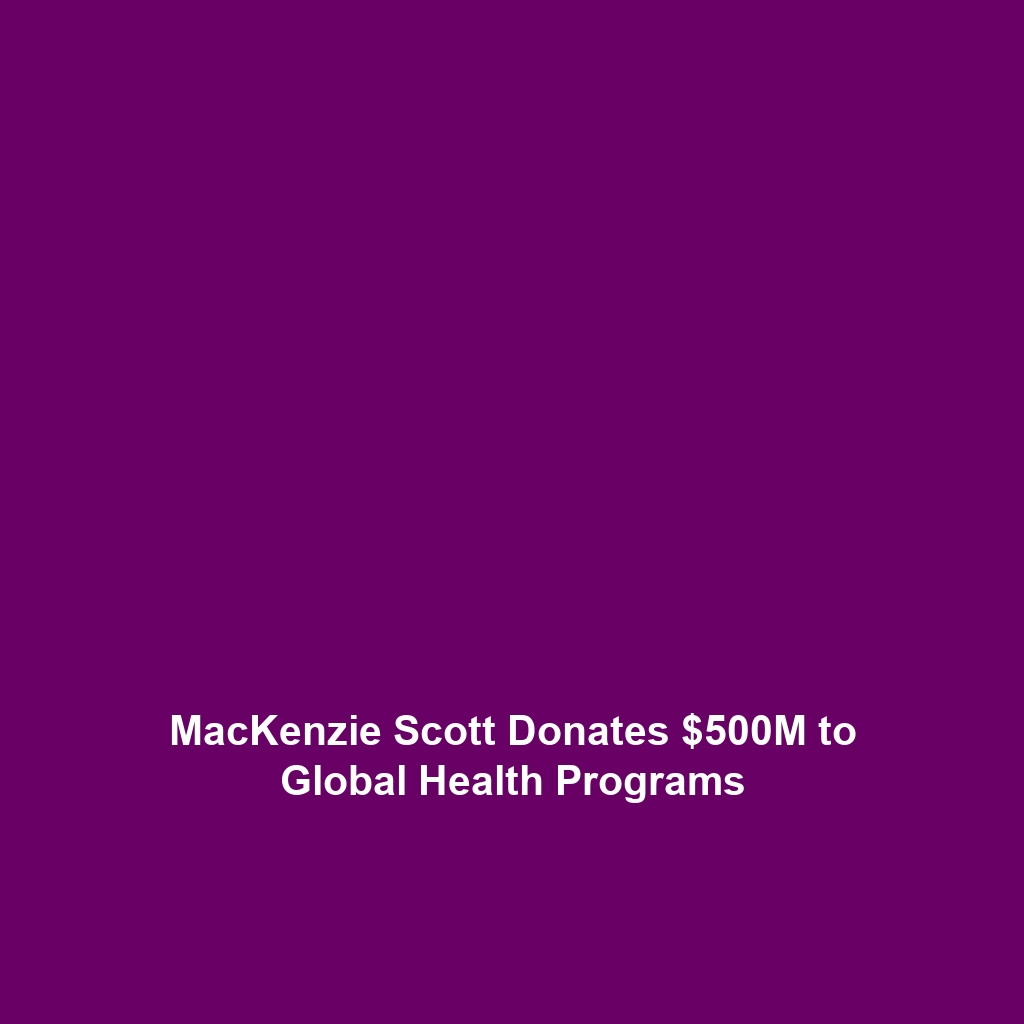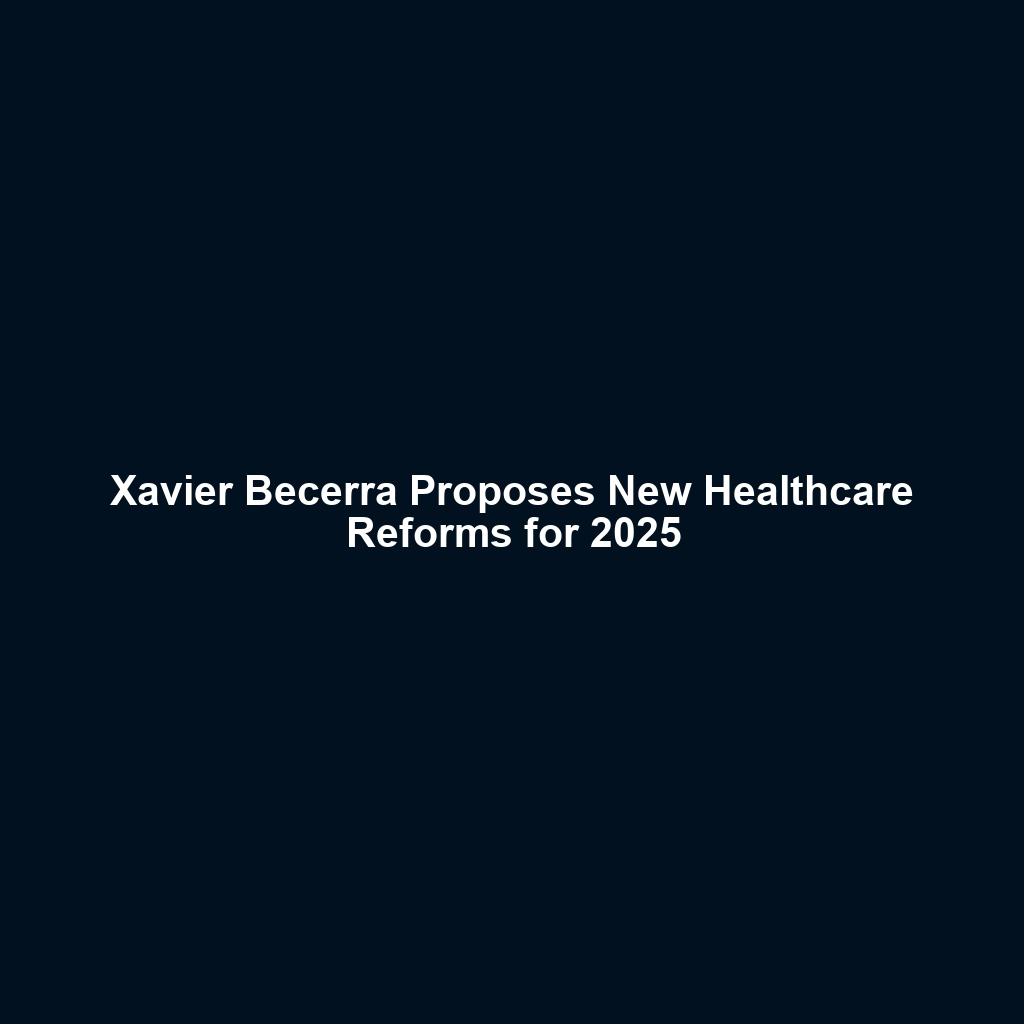Your cart is currently empty!
Tag: health equity

MacKenzie Scott Donates $500M to Global Health Programs
<>
MacKenzie Scott Donates $500M to Global Health Programs
MacKenzie Scott Donates $500M to Global Health Programs
In a landmark philanthropic move, MacKenzie Scott, the ex-wife of Amazon founder Jeff Bezos, has pledged $500 million to global health initiatives aimed at combating malnutrition and preventable diseases. This significant contribution underscores Scott’s commitment to supporting health programs that address pressing global health challenges.
Targeting Malnutrition and Preventable Diseases
Scott’s $500 million donation will support a range of organizations and initiatives that focus on alleviating malnutrition and preventing diseases that disproportionately affect vulnerable populations. The funds will be distributed amongst various non-profit organizations working in areas such as food security, maternal and child health, and infectious disease prevention.
According to the World Health Organization (WHO), nearly 690 million people are undernourished globally, a number that has been exacerbated by the COVID-19 pandemic. Scott’s donation aims to not only address the immediate effects of malnutrition but also tackle the broader systemic issues that contribute to it.
The Importance of Philanthropic Support
Philanthropic contributions are critical in the fight against public health crises, particularly in low-income countries where funding is limited. Experts argue that private donations like Scott’s can be pivotal for programs that might not receive priority in government budgets.
Dr. Sarah Thompson, a public health professor at Johns Hopkins University, remarked, “Scott’s donation comes at a crucial time when global health systems are still recovering from the impacts of the pandemic. It sends a strong message that investing in health equity is a global priority.”
Scott’s Philanthropic Journey
Since her divorce from Bezos in 2019, Scott has emerged as one of the most prominent philanthropists in the world. Her giving approach is characterized by a commitment to providing unrestricted funds to organizations rather than directing donations toward specific projects. This trust-based model enables organizations to allocate resources where they are most needed.
Scott has previously donated billions to various causes, including education, racial equity, and economic mobility, underscoring her focus on systemic change. Her latest donation reflects her ongoing dedication to improving health outcomes globally.
Potential Impact of the Donation
The $500 million donation is expected to significantly enhance the capabilities of organizations like Partners in Health and the Global Fund, which are crucial in delivering health services and resources to underserved communities. The contribution can help fund innovative health interventions and further research on health disparities.
The Global Fund, which focuses on combating AIDS, tuberculosis, and malaria, expressed gratitude for the donation, highlighting that the funds will help ensure health equity and access for marginalized populations. “With this level of financial commitment, we can scale our efforts and reach more communities in need,” stated Dr. Mark Dybul, a former executive director of the Global Fund.
Challenges Ahead
Despite the positive reception of Scott’s donation, significant challenges remain in the global health landscape. Malnutrition and preventable diseases are deeply intertwined with factors such as poverty, education, and access to healthcare. Simply injecting funds into these issues may not be sufficient without concurrent efforts to address these underlying factors.
Health experts stress that collaborative approaches, involving governments, NGOs, and the private sector, are essential to create sustainable change. For Scott’s donation to have lasting impact, it may need to be part of a broader strategic initiative that includes policy reforms and grassroots engagement.
Future of Philanthropy
Scott’s donation aligns with a broader trend in philanthropy that emphasizes the need for urgent action around health equity. As more individuals of wealth commit to the cause, there is potential for transformative impact on global health systems.
This shift is particularly relevant as the world continues to confront the long-term consequences of the COVID-19 pandemic, which has disproportionately affected vulnerable populations. Philanthropy will play a critical role in mobilizing resources to mitigate these impacts and support recovery efforts.
In conclusion, MacKenzie Scott’s $500 million donation offers hope for global health programs addressing malnutrition and preventable diseases. As organizations work to implement these funds effectively, the emphasis will be on creating sustainable solutions that extend beyond immediate relief efforts. With continued commitment from major philanthropists, there is potential for significant advancements in global health equity.

Xavier Becerra Proposes New Healthcare Reforms for 2025
Xavier Becerra Proposes New Healthcare Reforms for 2025
In a high-profile announcement earlier this week, U.S. Secretary of Health and Human Services (HHS) Xavier Becerra unveiled a series of ambitious healthcare reform proposals aimed at improving affordability and accessibility within the U.S. healthcare system. The reform agenda, which targets implementation by 2025, seeks to address the mounting challenges faced by millions of American citizens, particularly in light of rising healthcare costs and disparities in access to care.
Overview of Proposed Reforms
Becerra’s proposed reforms consist of several key initiatives designed to broaden insurance coverage, reduce prescription drug prices, and strengthen the overall healthcare infrastructure. Among the most notable proposals are:
- Expansion of Medicaid: Becerra seeks to expand Medicaid coverage to more low-income individuals across the nation, thereby reducing the number of uninsured Americans.
- Prescription Drug Pricing Reform: The plan includes measures to limit out-of-pocket expenses for prescription medications, enforcing price negotiations to ensure fair pricing.
- Investment in Telehealth Services: In response to the increased demand for remote healthcare services, the reforms propose significant investments in telehealth capabilities, making healthcare accessible to rural and underserved communities.
- Health Equity Initiatives: Targeting systemic inequities, the reform includes initiatives to improve access to care for marginalized populations, particularly Black, Indigenous, and other people of color.
The Need for Reform
Becerra’s proposals arrive at a crucial time as the U.S. healthcare system continues to grapple with rising costs and access disparities. According to a recent report from the Kaiser Family Foundation, nearly 30 million Americans remain uninsured, while those with insurance face exorbitant out-of-pocket expenses that often deter them from seeking necessary healthcare.
The COVID-19 pandemic has exacerbated these issues, underscoring the vital need for a comprehensive overhaul of the healthcare system that prioritizes patients’ financial and medical well-being. “We cannot afford to leave so many of our neighbors behind,” Becerra stated during the announcement, highlighting the urgent nature of these reforms.
Key Components of the Reform Agenda
Medicaid Expansion
One of the cornerstone elements of Becerra’s proposals is the expansion of Medicaid eligibility. Currently, states have the option to expand Medicaid under the Affordable Care Act, yet many—including several Republican-controlled states—have opted out, leaving millions without coverage. Becerra’s proposal aims to encourage these states to expand their programs through federal incentives.
Prescription Drug Pricing Reform
Another major aspect of the reform is focused on prescription drug pricing. The Administration plans to implement strategies similar to those adopted in countries with lower drug prices, such as setting limits on insulin costs and enabling Medicare to negotiate prices for high-cost medications. These steps are anticipated to greatly reduce financial burdens on patients and improve adherence to medication regimens.
Investment in Telehealth
Becerra’s agenda also includes a strong focus on telehealth services, which became a lifeline for many during the pandemic. The proposal outlines significant funding aimed at expanding telehealth infrastructure, making it easier for patients in rural areas or those facing mobility challenges to access necessary healthcare services.
Health Equity Initiatives
Furthermore, the reforms emphasize health equity. Becerra highlighted the persistent disparities in healthcare access and outcomes experienced by minority groups, stating, “Healthcare should be a right, not a privilege.” The proposed initiatives seek to invest in community health resources, workforce development, and culturally competent care practices.
Reactions from Stakeholders
Reactions to Becerra’s proposed reforms have been largely positive among healthcare advocates who view these changes as a step toward a more equitable healthcare system. The American Association of Health Plans (AAHP) expressed support, stating that greater access to affordable care is vital for the nation’s future, particularly as it emerges from the pandemic.
However, some lawmakers and industry stakeholders have raised concerns regarding potential costs associated with these reforms. Critics argue that increased federal spending and regulatory changes could burden state budgets and stifle innovation within the healthcare sector. “While the goals are admirable, we must also ensure that reforms do not unintentionally lead to negative consequences,” said Senator John Barrasso, a leading voice within the Republican party regarding healthcare policy.
Conclusion
Xavier Becerra’s proposed healthcare reforms for 2025 mark a significant shift in the U.S. healthcare landscape, aiming to bolster affordability and accessibility for millions of Americans. As the proposal navigates through legislative processes in the coming months, the focus will remain on balancing the ambitious goals with practical implementation strategies that address concerns from various stakeholders.
As the discourse surrounding these reforms continues, it will be crucial for all parties involved to engage in constructive dialogue aimed at refining the proposals to best serve the diverse needs of the American population while ensuring the sustainability of the healthcare system.



